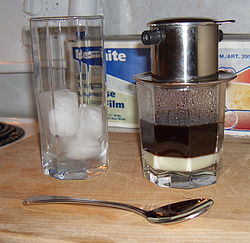Vietnamese iced coffee
This article needs additional citations for verification. (October 2009) |
 Cà phê sữa đá ready to be stirred and poured over ice | |
| Alternative names | Vietnamese iced coffee, cafe da |
|---|---|
| Type | Beverage |
| Place of origin | Vietnam |
| Region or state | Southeast Asia |
| Serving temperature | Hot or cold |
| Main ingredients | Dark roast coffee, water, sweetened condensed milk |
Vietnamese iced coffee (Vietnamese: cà phê đá, lit. 'iced coffee') is a traditional Vietnamese coffee recipe. It is created using coffee roasted between medium and dark. The drink is made by passing hot water through the grounds into a cup that already contains condensed milk. To serve the drink cold, ice is added to the cup.
Variations
[edit]
Variations involve additions of ice, sugar or condensed milk. A popular variation is cà phê sữa đá (or nâu đá in the North), which is iced coffee served with sweetened condensed milk.[1] This is done by putting two to three teaspoons or more of condensed milk into the cup prior to the drip filter process. Other variations include:
- Black coffee (hot or cold) - Cà phê đen[2]
- White coffee/Saigon style coffee - Bạc xỉu (Chinese: 白小, 白底小啡; Cantonese Yale: baahk síu, baahk dái síu fèh; lit. 'A cup of white milk with a bit of coffee'):[3] Cantonese-Vietnamese hot or iced milk with some added coffee, similar to a macchiato. Origin and popular in Saigon – Chợ Lớn.
- Pandan coffee - Cà phê lá dứa: Made with coffee, Pandan paste, and honey.
- Coconut coffee - Cà phê dừa: Made with coffee, coconut milk, and condensed milk.
- Blended coffee/Coffee shake - Sinh tố cà phê-
- Egg coffee - Cà phê trứng: Made with brewed coffee, chicken egg yolk, and condensed milk. It has a similar taste and texture to tiramisu and eggnog. Popular in Hanoi.
- Salted cream coffee - Cà phê kem mặn: a variation from Huế.
- Avocado coffee - Cà phê bơ: coffee grounds, avocado, condensed milk, and vanilla powder
History
[edit]Coffee was introduced to Vietnam in 1857 by a French Catholic priest in the form of a single Coffea arabica tree.[4] The beverage was adopted with regional variations. Because of limitations on the availability of fresh milk, as the dairy farming industry was still in its infancy,[5] the French and Vietnamese began to use sweetened condensed milk with a dark roast coffee.
Vietnam did not become a major exporter of coffee until the Đổi Mới reforms and opening of the economy after the war. Now, many coffee farms exist across the central highlands. Vietnam is now the largest producer of the Robusta variety of coffee and the second largest producer of coffee worldwide.[6]
See also
[edit]- Egg coffee
- Cuban espresso, similar sweetened coffee.
- Indian filter coffee, similarly produced (drip from metal filter) coffee.
- List of coffee beverages
References
[edit]- ^ Fabricant, Florence (2021-02-08). "Vietnamese Iced Coffee, Ready to Drink". The New York Times. ISSN 0362-4331. Retrieved 2023-02-11.
- ^ "Best Types of Vietnamese Coffee Tourists Need To Try In Hanoi". www.lasinfoniadelreyhotel.com. Retrieved 2023-02-02.
- ^ "Saigon Style Coffee [Bạc Xỉu]". Chef Tu David Phu: Vietnamese American Diaspora Cuisine. 3 April 2021. Retrieved 2023-02-02.
- ^ "The Story Of Coffee - Ho Chi Minh City, Vietnam". Atexpats.
- ^ "Ca Phe Sua Da - Ho Chi Minh City, Vietnam". Atexpats.
- ^ "World coffee exports". West African Studies: Regional Atlas on West Africa. 2009-07-15. doi:10.1787/9789264056763-graph30-en. Retrieved 2022-09-05.
External links
[edit]- Cà phê sữa đá, it's what's should be in your cup [sic] at ChestBrew.com
- History of Vietnamese Coffee and photographed step-by-step brewing at HungryHuy.com
- Illustrated instructions at wanderingspoon.com
- Vietnamese coffee recipe and notes at Coffeefaq.com
